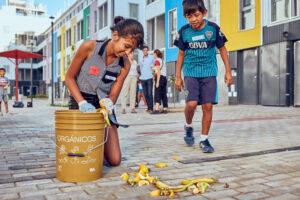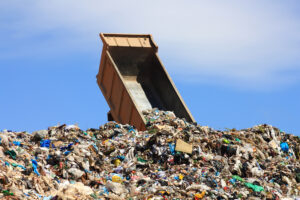The 28th United Nations Climate Change Conference, taking place over the next two weeks in Dubai, comes with a lot of firsts. The U.N. published its first “global stocktake,” a two-year progress report towards meeting the goals of the Paris Agreement and public health will take a central role on the agenda for the first time. In terms of making tangible progress in lowering GHG emissions, there’s another milestone worth noting: the first Waste and Resources Pavilion, a presentation area dedicated to the powerful climate mitigation opportunities hidden in our trash.
This Pavilion showcases the crucial role of waste in climate action. Humans generate over 2 billion metric tons of municipal waste every year, and at least a third of that is not managed “in an environmentally safe manner,” according to the World Bank. The separation and treatment of organic waste is especially relevant to the goals of COP28 because of the significant emissions reduction potential with easy and low-tech solutions.
The greenhouse gas impact of trash
 Globally, about half of all municipal waste consists of organics: food scraps, yard waste and other biodegradable refuse that often ends up in landfill or is burned with other waste, like plastics. When organics decompose in the low-oxygen environment of a landfill, they produce methane, a greenhouse gas up to 80 times more potent than carbon dioxide in its first two decades in the atmosphere. Landfills and wastewater account for 20% of global methane emissions, according to the Climate and Clean Air Coalition (CCAC), and methane is responsible for about a quarter of current global warming trends. Cutting methane emissions is widely regarded as one of the most effective ways to slow global warming in the near term.
Globally, about half of all municipal waste consists of organics: food scraps, yard waste and other biodegradable refuse that often ends up in landfill or is burned with other waste, like plastics. When organics decompose in the low-oxygen environment of a landfill, they produce methane, a greenhouse gas up to 80 times more potent than carbon dioxide in its first two decades in the atmosphere. Landfills and wastewater account for 20% of global methane emissions, according to the Climate and Clean Air Coalition (CCAC), and methane is responsible for about a quarter of current global warming trends. Cutting methane emissions is widely regarded as one of the most effective ways to slow global warming in the near term.
Two years ago, at COP26, the Global Methane Pledge was launched, calling on countries to agree to cut methane emissions 30% by 2030 relative to 2020 levels. The Pledge now has more than 150 country participants and has the potential to eliminate over 0.2°C of warming by 2050. However, current emissions suggest we haven’t made much collective progress toward that goal.
But getting there is still possible, and it starts with simple, low-tech solutions like getting households and businesses to separate their organic waste so it can be collected and processed away from landfill — thereby avoiding methane emissions. The climate impact of organics source separation doesn’t stop at methane reduction. With the right infrastructure and markets in place, those food scraps can be processed into renewable energy, compost that can support regenerative agriculture, and other circular markets.
Organic waste separation is becoming standard in high-income countries, but it remains rare in the Global South, where many people lack access to organized waste management systems of any kind. Landfills in much of the Global South are composed of a majority of organic material, which not only takes up space but releases toxic gasses and leachates that affect the health of nearby communities.
Scaling sustainable waste solutions
 At Delterra, we’re working on the ground in Latin America and Asia to help build the framework for sustainable organic waste management. With the support of our partners, including the CCAC and The Global Methane Hub, we build the capacity of municipalities and waste workers to implement segregated organic waste collection, develop processing infrastructure and offtake markets for treated materials like compost. This way, we are helping to create financially viable systems that remain self-sustaining well after our initial involvement.
At Delterra, we’re working on the ground in Latin America and Asia to help build the framework for sustainable organic waste management. With the support of our partners, including the CCAC and The Global Methane Hub, we build the capacity of municipalities and waste workers to implement segregated organic waste collection, develop processing infrastructure and offtake markets for treated materials like compost. This way, we are helping to create financially viable systems that remain self-sustaining well after our initial involvement.
In Argentina, for example, we have been successfully changing the behavior of citizens and businesses in several cities. We implemented segregated collection for organics in Barrio Mugica in Buenos Aires, today the only part of the city which collects this waste separately. We have also implemented segregated organics collection for entire municipalities, such as the medium-sized city of Olavarria, where all households and businesses now have segregated organics collection. We also train waste workers to have dedicated collection and processing of organics and help connect them to buyers for materials like compost.
Although the solutions to reducing landfilling and emissions from organic waste seem obvious, they fail to gain traction in most of the world for one main reason: economics. Scaling markets for organics requires bankable projects and most cities and national governments have not prioritized project development, capacity building and proofs-of-concept. Or worse, they have policies that actively depress any market for compost, such as subsidies for chemical fertilizers.
With climate finance being another major topic at COP28, there is a massive opportunity to get high ROI methane mitigation by addressing waste management in Global South countries. Not only will this give us a fighting chance of staying under 1.5°C, but it will improve the circularity of all materials (including plastics) and benefit the health and livelihoods of those impacted by mismanaged waste.
This blog was written and contributed by:


